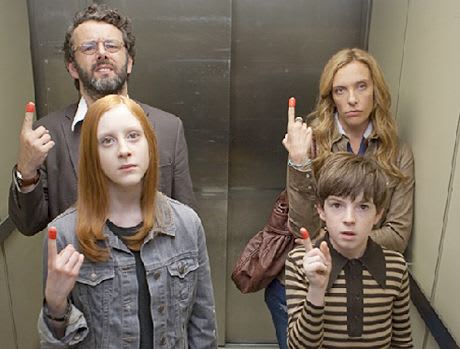Having missed his mark almost entirely with the little-seen dysfunctional family drama Fireflies in the Garden, writer/director Dennis Lee attempts to bark up the Wes Anderson tree with his sophomore outing, an extension of his 2003 student film, Jesus Henry Christ, with little success or accomplishment.
It's a cluttered work of tenuous thematic tangents and strained aesthetic contrivance that asks the unlikely, and unnecessary, question, "What if Little Man Tate was filmed somewhat like Rushmore and had a crudely insulting heteronormative slant?"
Like the intriguing but uneven directorial debut of Jodie Foster, Christ fashions itself a parable of alienated intellect, exploiting the precocious and embarrassingly hyperbolic depiction of child genius as a projection of adult anxieties. Here, the titular Henry (Jason Spevack) goes on tirades about religion as a construct of human ego, noting the inherent purposelessness and arbitrary nature of social conventions.
This Judeo-Christian adjacent ideology is mirrored by his conveniently quirky upbringing with a politically motivated, feminist mother (Toni Collette), whose conception of Henry in a test tube - no, a Petri dish - gives this overly stylized inner-dialogue of self-involvement a flimsy narrative when Henry discovers his possible father, professor and theorist, Slavkin O'Hara (Michael Sheen).
Shots frequently focus head on, utilizing a pastel aesthetic and routine crash-zoom style to reflect the many quirky comedies of the last 20 years - a style sadly reminiscent of Parker Lewis Can't Lose - reinforcing the murky thematic trajectory of skewed perspective. As our ten-year-old protagonist enters college, bonding, in an unlikely capacity, with his Ambien-reliant potential daddy, concepts of nature versus nurture mesh with an overall distain for Christian ethos while hypocritically settling on traditionalism as a mode of self-preservation and sustainment. Similarly, the jump cuts and overly stagey, ugly mise-en-scène dissipate as self-actualization through defeatist traditionalism triumphs over self-confidence and individuality.
Somewhere in this film is a kernel of intrigue, noting the disastrous potential of existing in a vacuum free of social expectations, but the desperate stylizations and self-satisfied presentation of child genius as an amalgamation of adult personal expression and identity sullies it all with twee condescension. There's nothing worse than being patronized by someone that doesn't know what they're talking about.
(eOne)It's a cluttered work of tenuous thematic tangents and strained aesthetic contrivance that asks the unlikely, and unnecessary, question, "What if Little Man Tate was filmed somewhat like Rushmore and had a crudely insulting heteronormative slant?"
Like the intriguing but uneven directorial debut of Jodie Foster, Christ fashions itself a parable of alienated intellect, exploiting the precocious and embarrassingly hyperbolic depiction of child genius as a projection of adult anxieties. Here, the titular Henry (Jason Spevack) goes on tirades about religion as a construct of human ego, noting the inherent purposelessness and arbitrary nature of social conventions.
This Judeo-Christian adjacent ideology is mirrored by his conveniently quirky upbringing with a politically motivated, feminist mother (Toni Collette), whose conception of Henry in a test tube - no, a Petri dish - gives this overly stylized inner-dialogue of self-involvement a flimsy narrative when Henry discovers his possible father, professor and theorist, Slavkin O'Hara (Michael Sheen).
Shots frequently focus head on, utilizing a pastel aesthetic and routine crash-zoom style to reflect the many quirky comedies of the last 20 years - a style sadly reminiscent of Parker Lewis Can't Lose - reinforcing the murky thematic trajectory of skewed perspective. As our ten-year-old protagonist enters college, bonding, in an unlikely capacity, with his Ambien-reliant potential daddy, concepts of nature versus nurture mesh with an overall distain for Christian ethos while hypocritically settling on traditionalism as a mode of self-preservation and sustainment. Similarly, the jump cuts and overly stagey, ugly mise-en-scène dissipate as self-actualization through defeatist traditionalism triumphs over self-confidence and individuality.
Somewhere in this film is a kernel of intrigue, noting the disastrous potential of existing in a vacuum free of social expectations, but the desperate stylizations and self-satisfied presentation of child genius as an amalgamation of adult personal expression and identity sullies it all with twee condescension. There's nothing worse than being patronized by someone that doesn't know what they're talking about.




